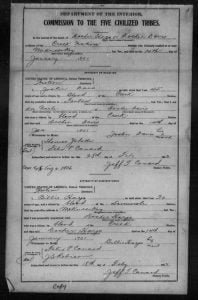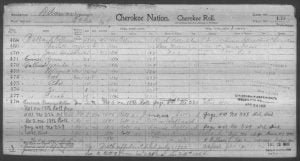Cherokees, Choctaw, Chickasaw and Creek, 1896 Applications
Please read the following for a better understanding of these pages. This is the Index of Cherokees, Choctaw, Chickasaw and Creek found on microfilm M1650 obtained from the National Archives in Fort Worth, Texas. If your ancestor was on the 1896 Cherokee Census they probably will NOT be on this index. This is NOT the 1896 CENSUS. It is an index of people who were NOT recognized by the Cherokee Tribe and subsequently made application to be considered for citizenship. Applications from the Bureau of Indian Affairs, Muskogee Area Office, Relating to the Enrollment of the Five Civilized Tribes under … Read more



